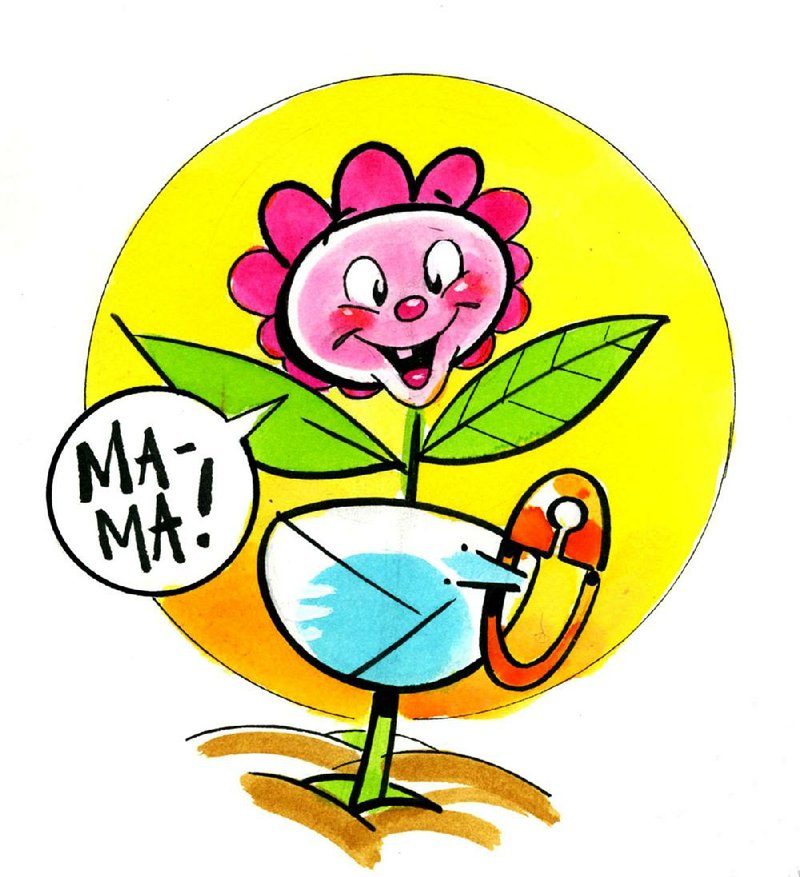Q I recently saw an article about using the granules that are in baby diapers mixed with potting soil. This is supposed to hold more moisture in the soil in potted plants. I didn't know how environmentally sound this was. Just knew you were the person to ask.
A I have seen the same video circulating on Facebook and other social media. The water-absorbing polymer in baby diapers is sold as soil mixes for plants -- typically called Watersorb or Soil Moist -- and they're probably cheaper than buying diapers and harvesting the granules. That being said, it is not something I recommend for most houseplants. This product can retain a lot of moisture, and overwatering of houseplants is the most common form of death for our plants. The only time it is useful is if you have containers for plants outside that are under a covered porch or patio, because it aids in water retention then. But don't get carried away; a little goes a long way.
Q I have a houseplant that I have never been able to identify. Its leaves look like a waterlily pad, waxy and thick, but not as thick as a succulent. The leaves are reddish on the underside. It puts off a rhizome that you can use to start a new plant. I think it is some type of begonia. Can you identify and give me any pointers on care?
A The plant in question is an old variety commonly called beefsteak begonia, Begonia erythrophylla. Another common name was pond lily, and it is one of the earliest hybrid begonias, dating to the late 1800s. This is one of the rhizomatous begonias, meaning simply that the plant grows from a modified stem called a rhizome. They are easy to propagate and do well inside in bright light and outside in the summer in shade. It usually has light pink blooms from winter through early spring.
Q I have a potted hydrangea that I brought inside for the winter. The leaves are getting black spots ... and then the whole leaf turns black and shrivels. New leaves seem to be replacing the dead ones, but what can I do to treat it so it won't continue losing leaves?
A Hydrangeas can suffer from various leaf spot diseases, but spraying indoors can be a challenge. I would move the plant to the sunniest location you have indoors and cut back on the amount of water you are giving the plant. Let it dry out between waterings. Make sure the pot has a drainage hole and that excess water can flow out. Remove the damaged leaves. In the spring, move it outside. If it is a florist hydrangea, they aren't as hardy as garden varieties, but many gardeners have luck with getting them to bloom from year to year. In the spring, plant it in a protected spot with good morning light and afternoon shade and see what happens.
Q I have a small garden with okra, eggplant and tomatoes. The aphids literally destroy my okra and eggplants each year, but they don't seem to bother the tomatoes. I have tried many things with little success. Malathion helps a little but I must spray every other day. What would you suggest?
A I would not suggest Malathion as often as you are applying it. It should be effective, but there is a waiting period between application and harvesting. Okra in particular needs almost daily harvesting when it is in season. Are you positive it is aphids? Eggplant typically has an issue with flea beetles, which are a bit harder to control than aphids. Malathion can kill aphids, and then spider mites may take over. Clean up the garden this winter, making sure you have a clean slate to work with. Practice crop rotation, not planting the same thing in the exact same spot for three years, and then monitor the plants. Aphids tend to be worse when weather conditions are dry -- they are poor swimmers. Insecticidal soap is quite effective, if you do thorough spraying. Aphids congregate at the tips of the plants and at the joints where leaves attach to the stems. They multiply rapidly. If you have similar problems this summer, take a plant-with-insects sample in to your local county Extension Service office to make sure you are treating for the right insect.
Janet B. Carson is a horticulture specialist for the University of Arkansas Cooperative Extension Service. Write to her at 2301 S. University Ave., Little Rock, Ark. 72204 or email her at
jcarson@arkansasonline.com
HomeStyle on 01/31/2015
